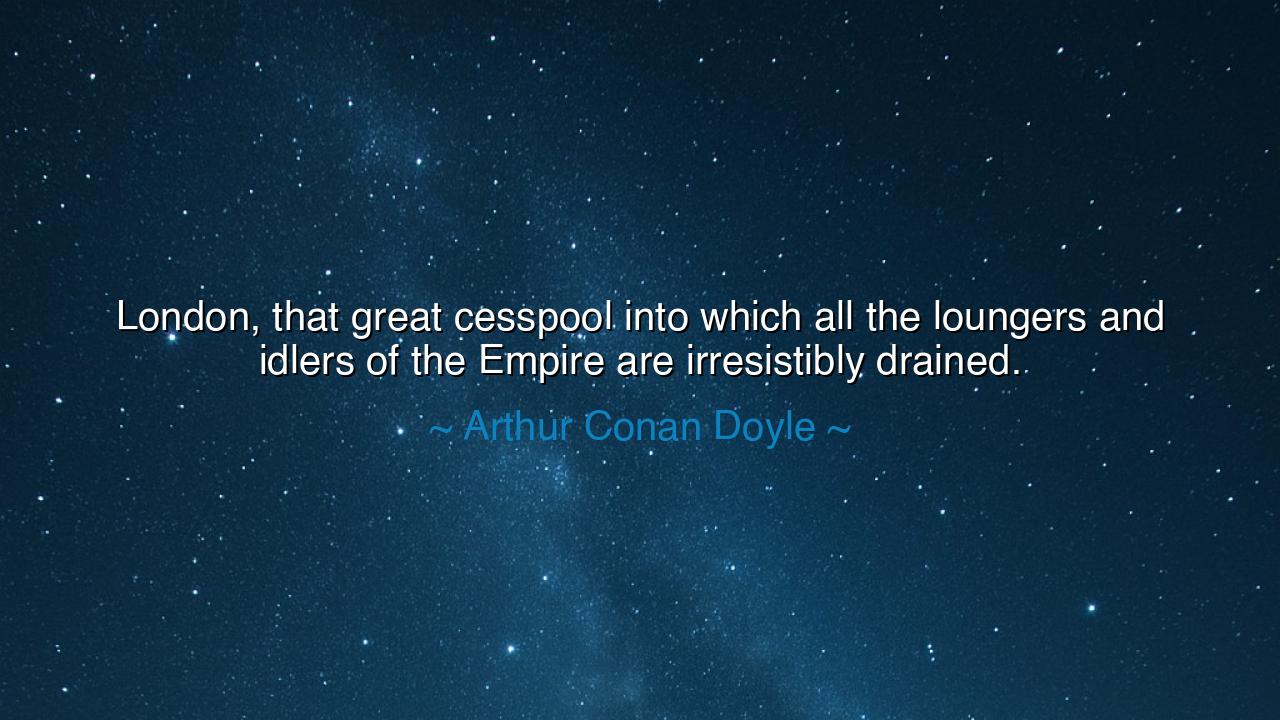
London, that great cesspool into which all the loungers and
London, that great cesspool into which all the loungers and idlers of the Empire are irresistibly drained.






In the words of Arthur Conan Doyle, “London, that great cesspool into which all the loungers and idlers of the Empire are irresistibly drained.” These words, grim and vivid, capture not only the vision of a city, but the soul of an age — an empire swollen with ambition, yet burdened by its own excess. To call London a “cesspool” is not mere insult; it is a revelation. Doyle, through the voice of his immortal creation Dr. John Watson, saw the capital not only as the glittering heart of the British Empire, but also as its shadow — the place where its failures, vices, and forgotten souls gathered. It was a city both magnificent and miserable, radiant and rotten, a mirror of civilization’s triumphs and its decay.
The origin of this quote lies in A Study in Scarlet (1887), the first of the Sherlock Holmes novels. In the opening pages, Dr. Watson — recently returned from the battlefields of Afghanistan — describes London through the eyes of a weary man seeking purpose. It is his introduction to the metropolis that would become the stage for his adventures with Holmes. Watson’s lament reflects not hatred, but awe — the awe of one who beholds a city so vast that it devours all who wander into it. Doyle, writing in the twilight of the Victorian era, saw London as the ultimate symbol of modernity: a place of genius and poverty, innovation and crime, faith and corruption. It was the Empire’s heart, pumping both gold and filth through its veins.
When he writes of “loungers and idlers of the Empire,” Doyle refers to those who, displaced or defeated by the world’s great machine, found themselves drawn to London’s labyrinth. Soldiers returned from distant wars, colonial traders who had lost their fortunes, dreamers and beggars alike — all came seeking fortune, redemption, or oblivion. London was the magnet of the Empire’s restless souls, its failures as well as its successes. Yet in this gathering of the lost, Doyle also found fascination. For in that “cesspool,” his detective — Sherlock Holmes — would find his purpose: to impose reason upon chaos, to bring light to the murk. Thus, from the city’s darkness, the light of intellect and morality would arise.
This vision of the city as both source of corruption and crucible of genius is not unique to Doyle. History has known many Londons, many Romes, many Babylons — cities where greatness and depravity coexist, where the heights of progress stand beside the depths of despair. In ancient Rome, the center of the empire drew citizens and slaves, poets and thieves, senators and assassins. It, too, was called a cesspool by its own philosophers, who saw how power and wealth attracted decadence. Yet, from that same mire emerged art, law, and ideas that shaped the world. So it was with London in Doyle’s time — the world’s new Rome, radiant and reeking, a furnace of humanity from which both ruin and glory were forged.
There is in Doyle’s words also a warning, one that transcends his century: that civilization’s brilliance breeds its own shadows. When a society grows powerful, it draws not only the best minds but the lost ones; not only laborers but leeches. A great city becomes a reflection of the world it rules — its hopes, its sins, its contradictions. London’s fog, so often described by Doyle, was more than weather — it was a veil over conscience, a symbol of how progress can obscure moral decay. Yet, within that fog, men like Holmes emerged — symbols of clarity, order, and truth, proving that even in the darkest cesspool, light can endure.
Let us, then, draw the lesson that Doyle’s words quietly carry. Every “London” in the world — every center of power, every prosperous age — must beware the illusion that greatness erases corruption. The higher we rise, the deeper our shadows grow. Yet the solution is not retreat, but vigilance — to be like Holmes amid the fog, seeking truth where others turn away, finding meaning where others see only filth. Civilization, like the human soul, must constantly cleanse itself; otherwise, it stagnates and rots.
So, my children of this modern age, remember: when you look upon your own cities — the glittering towers, the busy streets, the endless noise — do not forget the unseen lives that move beneath them. Every metropolis hides its “cesspool,” the place where the forgotten drift. But also remember that from these depths, greatness can rise — compassion, courage, and the eternal pursuit of truth. As Doyle showed us through his vision of London, it is not the purity of a city that defines it, but the light that refuses to die within its darkness. To build such light within yourself is to ensure that no cesspool, however vast, can ever drown the human spirit.






AAdministratorAdministrator
Welcome, honored guests. Please leave a comment, we will respond soon